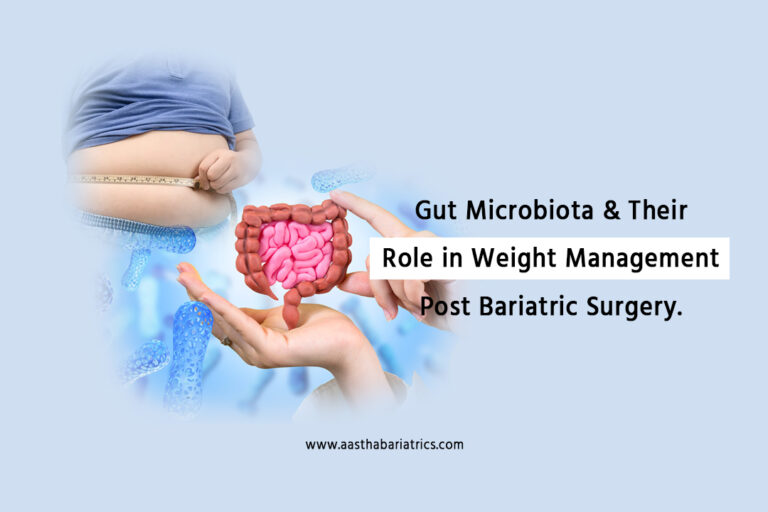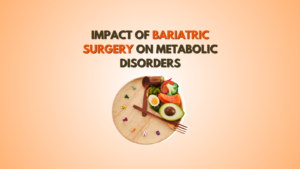
Vidhi Dave
Bariatric Dietician & Content Writer
Gut Microbiota Their Role in Weight Management Post Bariatric Surgery.

Do you think your shirt is too tight on you?
This is the sign that may lead to obesity. Obesity is an alarming medical issue that occurs when a person carries excess weight or body fat that might affect their health. The issue of obesity goes beyond appearance. It is a long-term medical condition that can result in diabetes, hypertension, heart disease, gallstones, and other chronic disorders. It is also linked to cardiovascular diseases that are linked to obesity, such as heart disease.
The diverse community of trillions of bacteria, viruses, fungus, and other microbes known as the gut microbiota lives in the gastrointestinal system. This microbe’s involvement is beyond the gastrointestinal system. Microbes have a great impact on our immune system. They are also present in the oral cavity, genital organs, skin and respiratory tract.
Dysbiosis, or changes in the gut microbiota’s composition, has been connected to a number of metabolic diseases, including obesity and type 2 diabetes.
Bariatric Surgery and Microbiota
Bariatric surgery, which includes treatments including gastric bypass, sleeve gastrectomy, and gastric banding, causes anatomical and physiological changes that lower food intake, cause malabsorption, and alter gut hormone signalling. This results in weight loss. The path to long-term weight loss, however, does not end with the surgery.
Probiotics: Live bacteria called probiotics are meant to improve one’s health when ingested or administered topically.Often referred to as good bacteria. Many foods are available with one or more of the probiotics, including yoghurt, sauerkraut. Some milk, miso, tempeh, frozen yoghurt, juices and cereals also contain live cultures
Although bacteria and other microbes are sometimes perceived as destructive “germs,” many of them are actually beneficial. Some bacteria create vitamins, assist breakdown of disease-causing cells, or help with food digestion. Probiotics also help in weight loss among bariatric surgery. Also probiotics support vitamin synthesis and introduce “good” bacteria within your gut. Probiotics help prevent gas, diarrhoea, and cramping.
Prebiotics: Prebiotics are a form of fibre that the body is unable to digest. They act as food for probiotics, which are microscopic, living microorganisms like bacteria and yeast. Prebiotics and probiotics both have the potential to support beneficial bacteria and other organisms in the gut.
Prebiotics may promote gut health, resulting in improved digestion, fewer antibiotic-related health issues, and other advantages.
People can make sure they eat a variety of prebiotics, which may feed different strains of bacteria, by adding a variety of foods in their diet. Several fruits, vegetables, and whole grains are among the high-fibre foods that contain prebiotics. Post-operative pre-probiotic usage may enhance the effects of Roux-en-Y Gastric Bypass (RYGB).
Ways to improve postbiotic concentrations include eating prebiotic and probiotic foods.
Postbiotics: Byproducts of fermentation carried out by probiotic bacteria after ingesting prebiotics or we can say that when probiotics feed on certain types of fibre molecules in order to thrive, they leave behind “waste products” known as postbiotics. Being called a waste product might not sound impressive but they have a great impact on our gut, and also help with side effects due to obesity. Amino acids, vitamins B and K, antimicrobial peptides, and other nutrients are healthy postbiotics because they help to inhibit the growth of harmful microbes. Several prebiotics, probiotics and postbiotics are recommended for patients who underwent bariatric surgery procedures for better clinical outcomes.
Synbiotics: In order to maximise the benefits of both probiotics and prebiotics, they are combined to create synbiotics. Synbiotics provide a thorough method for modifying the gut microbiota since they give both live microbes and the substrates they need to grow. In postoperative weight management, where enhancing gut health is crucial, this dual-action approach shows promise.
Post bariatric surgery there are some changes happening in gut health with respect to hormonal changes and acid secretion. These changes can impact the absorption of vitamins in our body which can be compensated by production of postbiotics. Also post bariatric surgery what you consume is directly proportional to growth of good or bad bacteria, which can further impact the weight loss journey of the patients.
Following bariatric surgery, the road to effective weight management is complex and calls for more than simply a change in food and exercise habits. Utilising probiotics, prebiotics, synbiotics, and postbiotics offers a comprehensive strategy that focuses on the complex relationships between our gut health and metabolism.
Integrating these solutions into postoperative care may improve weight loss maintenance and general wellbeing as we continue to learn more about the gut microbiome. It’s a journey towards a better, happier life following bariatric surgery that blends cutting-edge technology with the ancient knowledge of caring for our bodies from the inside out. Just keep in mind to keep the big picture when it comes to supporting your microbiome and preserving a healthy gut. Consider making other lifestyle adjustments that you can afford to in order to improve your health, such as eating a diet high in nutrients, limiting or avoiding processed foods, and exercising more frequently.






